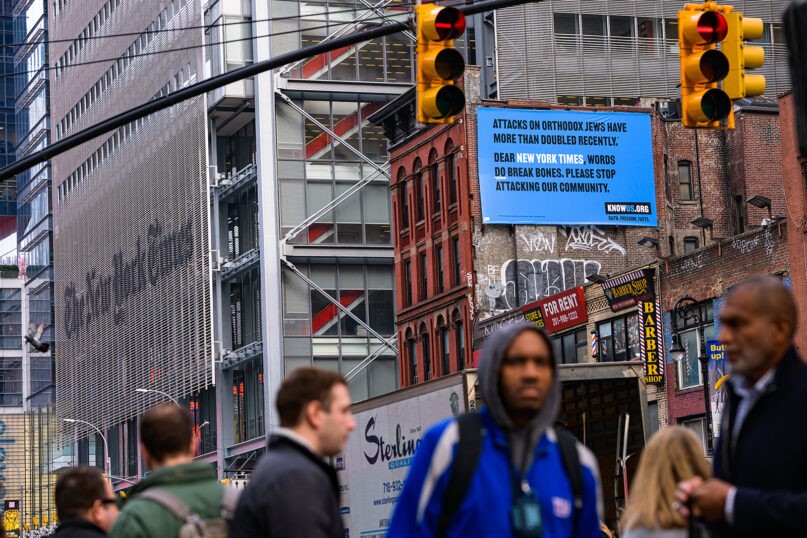Haredi group lashes back at New York Times reporting on schools

Agudath Israel of America, a lobbying group on behalf of Haredi Jewish synagogues and schools, has mounted an aggressive media and billboard campaign answering a New York Times investigation into New York state’s private yeshiva schools.
The campaign, with a new website and at least three billboards in Manhattan, accuses the newspaper’s investigation of threatening Haredi Jews’ safety and way of life at a time when antisemitism against Jews is rising.
One prominent poster juxtaposes two panels. “2x New York City Antisemitic Attacks Doubled,” reads one. The other reads: “12 New York Times Articles Against Orthodox Jews in 3 Months.”
“We believe their reporting is unfair and in many cases biased,” said Yitz Frank, Ohio director of Agudath Israel. “It creates a negative tone about our community among the public. That’s what we’re worried about.”
The new website, called KnowUs.org, points to the growing incidence of violence against Orthodox Jews in New York enclaves, concluding: “A major newspaper launching a campaign against a minority group is always wrong. In this climate, it is deeply concerning.”
The New York Times investigation into the schools, which began with a front-page story in September, found that New York area yeshivas deprive students of secular education, so much so that at one school, all 1,000 students failed the standardized tests in reading and math.
The stories reported that some students have been subjected to physical abuse from poorly paid, unqualified teachers. Meantime, the paper reported, these yeshivas have taken in more than $1 billion in federal, state, and local taxes over the past four years alone.
Shortly after the first story was published, the paper reported that the largest such yeshiva in New York state, the Central United Talmudical Academy in Williamsburg, Brooklyn, agreed to pay fines and restitution totaling more than $8 million for paying teachers off the books and requesting reimbursements for meals for students that it never actually provided.
A spokesman for the Times said the paper was confident in the accuracy of its reporting.
“Our reporters have spent months seeking to help readers understand what is happening inside some of New York’s lowest-performing schools, speaking to hundreds of parents, students, and educators to explain the inner workings of Hasidic Jewish religious schools, which receive substantial amounts of public money,” the spokesman said in an email.
David Zwiebel, executive vice president at Agudath Israel, would not disclose how much money it was spending on the campaign.
Agudath Israel is New York state’s third largest educational lobbyist (behind New York State Association of Independent Schools and the New York State Catholic Conference).
A nonprofit organization set up to challenge the yeshivas to improve secular education said the campaign was misguided.
“They’re a multimillion-dollar lobbying firm that invests heavily in getting funding for these schools,” said Beatrice Weber, executive director of Young Advocates for Fair Education, or Yaffed. “They feel incredibly threatened by these issues.”
Weber, whose organization is cited on the Know Us website as a source of the Times’s criticism of Haredi schools, said it was dangerous for Agudath Israel to conflate rising antisemitism with the New York Times’s investigation.
“There’s real antisemitic things happening but it’s not investigative reporting from the New York Times,” Weber said. “That’s not where antisemitism is happening.” —Religion News Service




